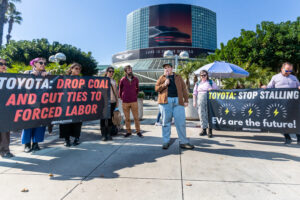Toyota in the slow lane at the LA Auto Show
Public Citizen and allies expose Toyota's greenwashing and dirty supply chain
By Erika Thi Patterson

Every November, the Los Angeles Auto Show opens its doors to thousands of consumers eager to test drive automakers’ latest models. With California being home to 40% of America’s EV sales, ten automakers debuted new electric vehicle (EV) models this year on the auto show’s “Electric Avenue” test track. Unsurprisingly, long-time climate laggard Toyota was noticeably absent from Electric Avenue. Toyota, however, featured a misleading exhibit describing its fossil fuel-powered hybrid fleet as “electrified” and “beyond zero [emissions].”
That’s why Public Citizen, Jobs to Move America, and allies used the auto show as a vehicle to call out Toyota’s blatant greenwashing and expose serious environmental and human rights abuses in its supply chain.
On the opening day of the LA Auto Show, Public Citizen unfurled banners at the entrance that read “Toyota: Stop Stalling, EVs are the Future,” and “Toyota: Drop Coal and Cut Ties to Forced Labor.” After fastening the banners to a fence lining the exhibition halls, activists also greeted and leafletted attendees with hard facts about Toyota’s bad track record.
Add your name to tell Toyota to clean up its act.
Toyota’s dirty lobbying record and supply chain practices
As the world’s largest automaker, Toyota is an industry titan that could accelerate the move to EVs and jumpstart remaking auto supply chains that are sustainable, equitable, and fossil-free. That would require a big shift from its current approach.
For years, Toyota has fought zero-emission vehicle mandates and tried to weaken other climate initiatives in the US and in countries around the world. Toyota is also currently opposing the Environmental Protection Agency’s proposed rules to cut pollution from passenger vehicles.
Not only is Toyota consistently ranked as one of the most obstructionist companies on climate policy, but the company has also lobbied against pro-worker policies, like EV tax credits that would have benefitted union auto assembly plants. The company has also waged vicious union-busting campaigns against its workers when they’ve tried to organize at its U.S. facilities.
As for the company’s supply chain, Toyota’s steel and aluminum suppliers still heavily rely on dirty, coal-powered processes. Pollution from coal-dependent supply chains is linked to respiratory illnesses and cancer for communities of color on the fence lines of these operations.
Even worse, its steel supply chain has been linked to state-sponsored forced migration, human trafficking, forced labor, and enslavement of the Uyghur Muslim people in China’s Xinjiang region.
Toyota wants us to think it’s an industry leader on sustainability. But in reality, Toyota lobbies to block climate action and uphold anti-worker practices, all while failing to address serious environmental and human rights issues linked to its supply chain.
These issues are horrific but sadly not uncommon or surprising. Toyota has some of the weakest policies to account for, remedy, and prevent harms in its supply chain.
What real industry leadership looks like
Toyota’s reputation is defined by being anti-climate action, anti-worker, and for ignoring egregious issues in its supply chain.
Toyota must change course and match its actions to the image it is projecting. It should:
- embrace EVs and phase out combustion engine vehicles;
- set science-based targets to decarbonize its supply chains;
- end ties with suppliers linked to forced labor and other human rights abuses; and
- adopt robust enforcement and remedy mechanisms to prevent future harms and abuses.
Take action today to demand Toyota stop greenwashing and clean up its supply chain!